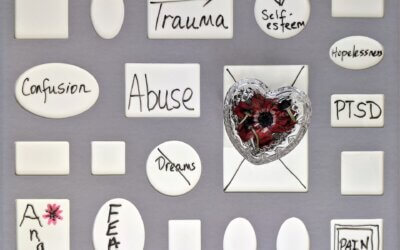EMDR Treatment for Healing Trauma

OvercomingTrauma Symptoms with EMDR Therapy
EMDR (Eye Movement Desensitization and Reprocessing) therapy is a recognized and effectiveapproach for addressing trauma and its associated symptoms.
Hereare some common trauma symptoms that EMDR therapy can assist in overcoming:
- Intrusive thoughts or memories related to the traumatic event.
- Nightmares or flashbacks of the traumatic event.
- Avoidance of places, people, or activities that remind you of the trauma.
- Emotional distress, such as sadness, anxiety, or irritability.
- Hypervigilance or being constantly on guard.
- Difficulty concentrating or feeling easily distracted.
- Insomnia or trouble sleeping.
- Feeling detached from others or a sense of emotional numbness.
- Loss of interest in activities you once enjoyed.
- Negative thoughts about oneself, others, or the world.
- Emotional reactivity, including anger or irritability.
- Social withdrawal or isolation.
- Difficulty trusting others or forming close relationships.

What Clients have said about EMDR:
I can think back about what happened to me, but the memory is no longer alive.”
I used to have to worry all the time about something triggering me and feeling upset. Now, I don’t even think about triggers anymore.”
I thought about what happened to me every single day for 20 years. Now, I don’t even think about it unless I want to.”
I used to believe that I caused what happened to me. I now understand that it was not my fault.”
Thanks to EMDR, I feel like I have a whole different future.”
EMDR May Be A Good Choice For You If:
- You are still experiencing distressing thoughts or feelings from past events.
- You have decided to go through a trauma recovery process.
- You have tried self-help books or other therapies and nothing has seemed to help. EMDR can make a difference in many cases when traditional talk therapy did not work.
- You want to spend less time in therapy. EMDR frequently takes much less time than other techniques to be effective.
- You don’t want to talk in great detail about what has happened to you.
How does EMDR work?
“The goal of EMDR therapy is to leave you with the emotions, understanding, and perspectives that will lead to healthy and useful behaviors and interactions.”
When we experience a traumatic event, our central nervous system kicks into high gear by supplying us with our best resource for survival our stress response (fight, flight, freeze).
Often distressing events are processed sufficiently, and the brain heals itself. These “normal” memories are stored in the part of our brain called the hippocampus.
Sometimes, however, we lack the opportunity to process what has happened to us fully. The stress response (fight, flight, freeze) that helped us survive the trauma event never gets turned off, impeding our ability to process. The hippocampus can’t do its job correctly, and the traumatic memories are not stored properly.
Raw, unprocessed memory fragments, disturbing images, thoughts, and emotions can resurface and manifest in feelings of being back in that moment or being “frozen in time.”
That’s where EMDR comes in.
EMDR assists different parts of the brain in communicating more effectively with each other. Through EMDR processing, the traumatic memory becomes part of the existing positive memory network. You will remember your traumatic experience without the original fight, flight, or freeze response. EMDR therapy helps the brain process traumatic memories allowing your normal healing process to resume.

Changing the memories that form the way we see ourselves also changes the way we view others. Therefore, our relationships, job performance, what we are willing to do or are able to resist, all move in a positive direction.
Start Healing with Iris Hogan:
What Takes Place During Treatment?
The Eight Phases Of EMDR
Phase 1 – History Gathering and Treatment Planning
We will begin by gathering information to understand your history, and develop a treatment plan during the first treatment stage.
Phase 2 – Preparations
8 Signs that Your Anxiety May Be a Problem?
- Do your worries keep you awake at night; do you have a hard time keeping negative thoughts at bay?
- Have you experienced a panic attack: racing heartbeat, shortness of breath, or feelings of terror?
- Do you feel like an outsider even with friends, like you don’t quite fit in anywhere?
- You’re distracted by a stream of intrusive anxious thoughts.
- Does your Anxiety at work, home, or socially making it challenging to excel and perform?
- Do you avoid activities you might enjoy because of a feeling of dread?
- You suffer from headaches, nausea, vomiting, chest pain, or stress-related health concerns.
- Is my Anxiety is hurting my relationships?
Phase 3 – Assessment
8 Signs that Your Anxiety May Be a Problem?
- Do your worries keep you awake at night; do you have a hard time keeping negative thoughts at bay?
- Have you experienced a panic attack: racing heartbeat, shortness of breath, or feelings of terror?
- Do you feel like an outsider even with friends, like you don’t quite fit in anywhere?
- You’re distracted by a stream of intrusive anxious thoughts.
- Does your Anxiety at work, home, or socially making it challenging to excel and perform?
- Do you avoid activities you might enjoy because of a feeling of dread?
- You suffer from headaches, nausea, vomiting, chest pain, or stress-related health concerns.
- Is my Anxiety is hurting my relationships?
Phases 4 to 6 – Desensitization
8 Signs that Your Anxiety May Be a Problem?
- Do your worries keep you awake at night; do you have a hard time keeping negative thoughts at bay?
- Have you experienced a panic attack: racing heartbeat, shortness of breath, or feelings of terror?
- Do you feel like an outsider even with friends, like you don’t quite fit in anywhere?
- You’re distracted by a stream of intrusive anxious thoughts.
- Does your Anxiety at work, home, or socially making it challenging to excel and perform?
- Do you avoid activities you might enjoy because of a feeling of dread?
- You suffer from headaches, nausea, vomiting, chest pain, or stress-related health concerns.
- Is my Anxiety is hurting my relationships?
Phases 7 and 8
10 Things You Can Do Right Now To Feel Better
- Cut down your caffeine intake. Caffeine can interfere with sleep, make your anxiety worse, and even lead to panic attacks.
- Get enough sleep. Anxiety can lead to insomnia, and not sleeping enough decreases your ability to cope with stress and anxiety.
- Eat healthily. Eat well and often. Several smaller meals during the day are often better than three big meals for people with anxiety. When you go without food for long periods, your blood sugar drops, leaving you anxious and irritable and eating complex carbohydrates (whole grains, fruits, and vegetables). Complex carbs stabilize blood sugar and boost serotonin, a neurotransmitter with calming effects.
- Avoid alcohol and nicotine. Alcohol makes anxiety worse! It offers the lure of reducing anxiety and worry short-term. Still, it causes anxiety symptoms to intensify as it wears off. Nicotine is a potent stimulant that leads to anxiety.
- Learn to use deep breathing and relaxation techniques. Techniques like progressive muscle relaxation, deep breathing, and meditation have all been proven effective.
- Getting daily exercise can make a big difference in lowering your anxiety level. Exercise releases tension and reduces stress levels, which makes it a natural antidote to anxiety; it also releases endorphins, our brain’s “feel-good chemicals.”
- Limit your sugar intake.
- Connect with others. Spending time with other people in a meaningful way has been shown to lower anxiety.
- Do what’s meaningful to you. Make time for activities that nurture you and matter to you.
- Practice self-compassion-Having anxiety is challenging! Listen to how you speak to yourself and ask, “would I talk like this to a friend?” Try speaking with yourself in a more accepting way and observe how you feel.
There is no right or wrong way to do EMDR and no prior skill is needed.
Each person processes information differently.
The purpose of EMDR is to reprocess trauma so that you can now feel differently about what happened in your mind, emotions, and body.
Number of Sessions
The number of treatment sessions required varies depending on what you want to work on, your history, and your treatment response. Working through one traumatic memory, of course, takes much less time than if you have multiple experiences you need to address.
Working on a single traumatic event can often be resolved in three to six sessions. EMDR will take longer if you are dealing with multiple traumas or a long history of abuse or neglect, or if you are currently in an unsafe environment.
EMDR Therapy Online
EMDR can also take place when you can’t come into the office for whatever reasons. I offer virtual EMDR through a secure, HIPPA compliant, and safe video platform. Many clients that have experienced both in-office and virtual EMDR sessions report that virtual EMDR is effective and has helped them heal.
EMDR is Well-Researched and Proven Effective
Research has demonstrated EMDR to be effective for trauma recovery. It is evidenced based and is considered the gold standard of care.
Controlled studies suggest that EMDR is as effective as CBT with exposure therapy.
EMDR has Advantages over Exposure Therapy. EMDR does not require any homework, results are often seen more quickly with EMDR, and EMDR is nonverbal, for those who prefer not to engage in exclusively talk-based therapy.
The American Psychiatric Association, the International Society for Traumatic Stress Studies, the Substance Abuse and Mental Health Services Administration, the U.S. Dept. of Veterans Affairs/Dept. of Defense, The Cochrane Database of Systematic Reviews, and the World Health Organization, among many other national and international organizations recognize EMDR therapy as an effective treatment. (About EMDR Therapy | EMDR International Association. https://www.emdria.org/about-emdr-therapy)

Schedule Today to Begin Your EMDR Treatment:
Relevant Articles by Iris Hogan
Eco-Anxiety: What is It and Why Do People Experience It?
Discover what eco-anxiety is, why it occurs, and the signs to look out for. Learn what you can do to cope with it and manage it better.
What Does Undiagnosed PTSD Look Like?
Undiagnosed PTSD can have significant negative impacts on your life. Recognize the symptoms and learn what to do about it.
Overcoming Tokophobia- Fear of Childbirth
Overcome the fear of childbirth with compassion and support. Learn about tokophobia, its causes, and coping strategies, and explore strategies.



